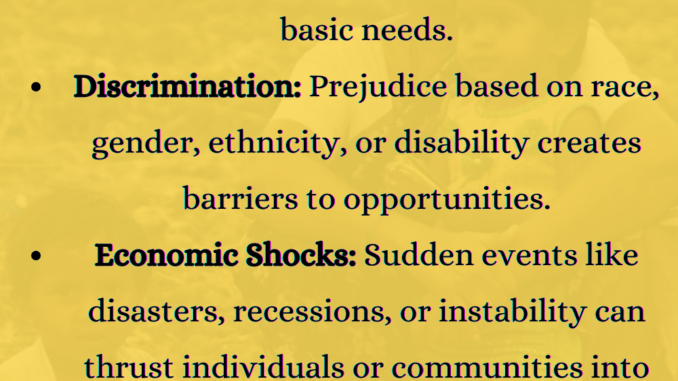
The Relentless Cycle: How Poverty is Constantly Created and Remade Daily
Poverty or destitution is a complex social issue that is influenced by various factors, including economic, political, cultural, and social factors. According to Bush (2007), poverty is constantly created and remade daily by processes inherent to the system.
Poverty, a persistent and complex issue, isn’t a one-time event; it’s a cycle that constantly perpetuates itself. Understanding how poverty is created, its various manifestations, and its evolution throughout history sheds light on why it’s so challenging to eradicate.
Politicians can play a significant role in shaping policies that impact poverty reduction, it is important to recognize that poverty is not solely caused or perpetuated by politicians. It is a systemic issue that requires a collective effort from different sectors of society to address it effectively.
These processes can include economic policies, government policies, social inequalities, and cultural beliefs and practices that perpetuate poverty.
How is Poverty Created
There’s no single answer to this question. Poverty arises from a complex web of factors:
Poverty is a complex and multifaceted issue that is perpetuated by various factors, many of which interact and reinforce each other. Here are several ways in which poverty is constantly created and remade daily:
1. Lack of Access to Education:
Education is often seen as a pathway out of poverty, yet many individuals living in poverty lack access to quality education. Without education, individuals are limited in their ability to secure well-paying jobs and break the cycle of poverty.
2. Unemployment and Underemployment:
Limited job opportunities, especially those that offer fair wages and benefits, contribute to poverty. Even for those who are employed, underemployment—working part-time or in low-wage jobs—can make it difficult to escape poverty.
3. Discrimination and Marginalization:
Discrimination based on factors such as race, gender, ethnicity, disability, or sexual orientation can prevent individuals from accessing opportunities for education, employment, housing, and healthcare, thereby perpetuating poverty.
4. Inadequate Healthcare:
Lack of access to affordable healthcare can result in poor health outcomes, which in turn can limit individuals’ ability to work and earn a living. Medical expenses can also push families further into poverty.
5. Housing Insecurity and Homelessness:
High housing costs, inadequate affordable housing options, and homelessness are major contributors to poverty. Without stable housing, individuals and families struggle to meet their basic needs and may face additional challenges in finding and maintaining employment.
6. Financial Exploitation and Debt:
Predatory lending practices, high-interest loans, and other forms of financial exploitation disproportionately affect low-income individuals, trapping them in cycles of debt and poverty.
7. Interconnected Systems of Injustice:
Poverty is often intertwined with other forms of systemic injustice, including institutionalized racism, sexism, and classism. These systems can create barriers to economic and social mobility for marginalized communities.
8. Environmental Factors:
Environmental degradation and disasters can disproportionately affect low-income communities, leading to loss of livelihoods, displacement, and increased vulnerability to poverty.
9. Intergenerational Transmission of Poverty:
Children growing up in poverty are more likely to experience poverty as adults, perpetuating a cycle of poverty across generations.
10. Policy Decisions and Economic Structures:
Government policies, economic systems, and budget allocations can either exacerbate or alleviate poverty. For example, austerity measures, regressive taxation, and cuts to social safety net programs can deepen poverty, while progressive policies such as minimum wage increases and universal healthcare can help reduce poverty.
11. Cultural Beliefs
Finally, cultural beliefs and practices can also perpetuate poverty by reinforcing negative stereotypes about people living in poverty.
For example, the belief that people living in poverty are lazy or undeserving can create a stigma that limits their ability to access resources and opportunities.
In summary:
- Limited Access to Resources: Lack of education, proper healthcare, and decent jobs restricts a person’s ability to earn a living and fulfill basic needs.
- Discrimination: Prejudice based on race, gender, ethnicity, or disability creates barriers to opportunities, hindering social mobility.
- Economic Shocks: Sudden events like natural disasters, economic recessions, or political instability can plunge individuals or entire communities into poverty.
- Conflict and War: Violence disrupts livelihoods, destroys infrastructure, and displaces people, leaving them vulnerable to poverty.
In summary, destitution is constantly created and remade daily by a complex set of processes inherent to the system. These processes can include economic policies, social inequalities, and cultural beliefs and practices that perpetuate poverty.
Addressing destitution requires a comprehensive approach that tackles these underlying factors and creates policies and programs that support economic and social inclusion for all.
Poverty is a complex issue that is shaped by a variety of factors, including political and economic processes. Addressing destitution will require a multi-faceted approach that addresses these underlying causes.
Some Other Interresting Articles;
Effective Communication: The Key to a Successful Relationship
Fundamental Techniques In Handling People
The Power And Benefits of a Smile
Benefits Of Keeping Your Life Private
Politician Lies, But How Do You Know A Politician Is Lying